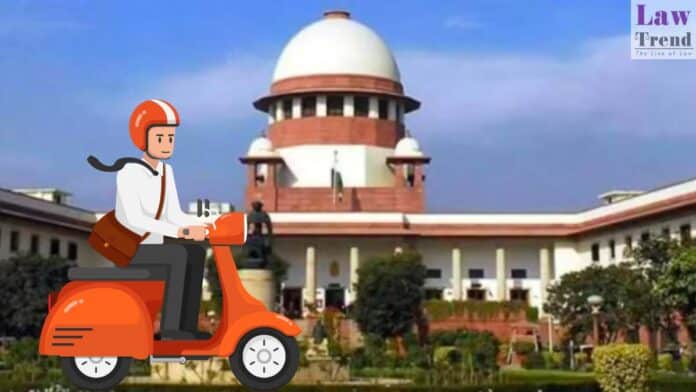The Supreme Court on Monday stayed the High Court order that essentially allowed bike-taxi aggregators Rapido and Uber to operate in the national capital by asking the Delhi government not to take any coercive action against them till a new policy was formulated.
A vacation bench of Justices Aniruddha Bose and Rajesh Bindal granted liberty to the two aggregators to request urgent hearing of their pleas by the Delhi HC.
The bench, which stayed the May 26 order of the Delhi HC, also recorded the Delhi government counsel’s submission the final policy will be notified before July-end.

The top court was hearing two separate petitions by the AAP government challenging the High Court order that no coercive action should be taken against the bike-taxi aggregators until the final policy was notified.
Last week, the top court had sought a response from the Centre on the pleas of Delhi government.
Earlier, senior advocate Manish Vashisht, appearing for the Delhi government, said the high court’s decision to stay the government’s notice till the final policy is notified is like virtually allowing Rapido’s writ petition.
On May 26, while issuing a notice to the Delhi government on Rapido’s plea challenging a law that excludes two-wheelers from being registered as transport vehicles, the high court directed that no coercive action should be taken against the bike-taxi aggregator till the final policy was notified.
The high court, which listed Rapido’s plea on August 22 before the registrar for completion of pleading, said, “The counsel for the petitioners (Rapido) submits that policy is under active consideration.”
“Accordingly, we hereby stay the notice and make it clear that the stay shall operate till the final policy is notified. However, once the final policy is notified, if the petitioners are still aggrieved, they are at liberty to take steps before the appropriate forum,” the high court said.
In its petition before the high court, Roppen Transportation Services Private Limited, which runs Rapido, has said the Delhi government order directing it to immediately stop plying non-transport two-wheelers from carrying passengers on hire-and-reward or for commercial purposes was passed without any reason or rationale.
In a public notice issued earlier this year, the government had cautioned bike-taxis against plying in Delhi and warned that violations would make aggregators liable for a fine of up to Rs 1 lakh.
Rapido has also challenged a showcause notice issued to it by the city government in that context, saying it is in violation of various fundamental and constitutional rights, and also of the principle of natural justice.
“The direction issued by the transport department under the impugned notice is ex-facie arbitrary and passed without following due process under law, without providing any reasons for such prohibition,” the plea said.
Also Read
It also said the city government’s conduct was contrary to the intent and object of the Centre with respect to the issuance of licences to aggregators as laid down under the Motor Vehicles Act, read with the Motor Vehicle Aggregator Guidelines, 2020 (MoRTH Guidelines).
“Transport department is yet to come up with its own guidelines with respect to plying of two-wheeler non-transport vehicles as transport vehicles for the purpose of aggregation and ride-sharing/ride-pooling.
“MoRTH Guidelines expressly allowed vehicle pooling in non-transport vehicles in furtherance of the central and state governments’ objective of reducing traffic congestion and automobile pollution and achieving effective asset utilisation unless it is prohibited by the state government,” the plea said.
It also said a blanket ban on the petitioner’s services impacts the lives and livelihood of a huge number of vehicle owners and riders as well as a substantial number of daily commuters.







